Focus on prisons and inmates
Updated:2011-12-04 09:38
(chinadaily.com.cn)
|
 |
|
Editor's note: Prison is a place to confine people and take away a range of personal freedoms as a penalty for crimes. Still, inmates' self-esteem and basic rights guaranteed by the law should be in no way deprived. Although many problems still exist in China's prisons, and some might be very serious, it's undeniable that much progress has been made in the country's jail management and practice as well as protection of inmates' human rights, thanks to a slew of new measures. This special report attempts to call the public's attention to what life is like in prison with the improving prison management. Editors: Rong Xiandong, Yan Weijue, Quan Li and Yang Jie |
|
Safeguarding Inmates' Rights |
|
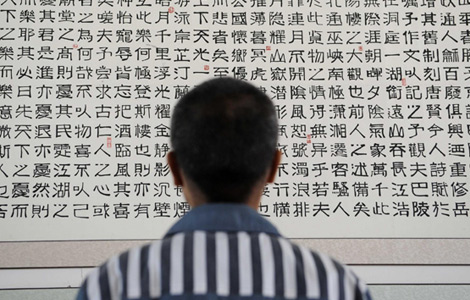 |
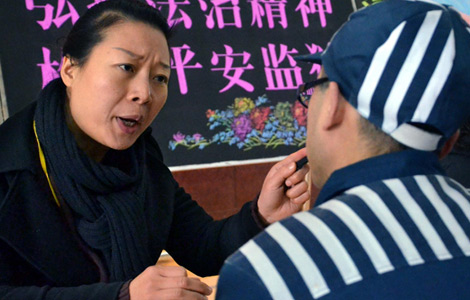 |
|
Progress made in protecting inmates' rights When Gao Xiaosong, a renowned musician in China, was released from a detention house on Nov 8 after serving 184 days for a drunken crash that caused a four-vehicle pile-up, he appeared to be in good spirits: his cheek still chubby and his shoulder-length hairstyle no different from the way he has kept it over a dozen years. Some cheered at his return, while a fair number of others started to question his appearance, which may have been the result of special privileges for a celebrity in jail, or in Gao's words, a detention house, a term he has insisted on using. "Why didn't he get a prison haircut?" an Internet blogger wrote on Weibo, a sentiment echoed by many others who believe a haircut is one of the many unwritten rules for convicts. "Actually that is explainable, as Chinese law doesn't stipulate inmates should get their hair cut and their beard shaved," says Hong Daode, a law professor at China University of Political Science and Law, in a telephone interview with the China Daily website on Wednesday. Many detention houses and jails give inmates a haircut because of hygiene concerns as well as convenience in management, said Hong, who also deemed the tradition is in decline in China as authorities have realized the importance of keeping inmates in custody in a dignified and humane manner. [Read more] |
Shanghai prison's management innovation It took everyone by surprise when a go (or weiqi) team chose the Shanghai New Criminal's Prison as one of their home courts in the Chinese Weiqi League for the season in 2005. The idea was the result of joint efforts by the prison and Shanghai Weiqi Association, who helped build a weiqi team with more than 40 inmates from the prison, in a bid to enrich their leisure time. Five years after the project, Liu Shizheng, the team's player as well as coach, still retains a clear memory of it. "It was a big sensation that drew attention from the United Nations," Liu said in a telephone interview on Thursday. "They even sent staff for photos of the game, which they praised as being a big stride in human rights of the inmates." As the game was held at the administration building, inmates were able to watch from a hall at the cellblock, with an instructor standing by to provide explanation. And they received tips from the pros after the game. The prison hosted two weiqi games in 2005 and 2006, as the team shifted its home court to another prison. But its innovation of prison management continues. "The establishment of Shanghai New Criminal's Prison itself is an innovation," says Ma Li, a researcher at the prison. [Read more] |
|
 |
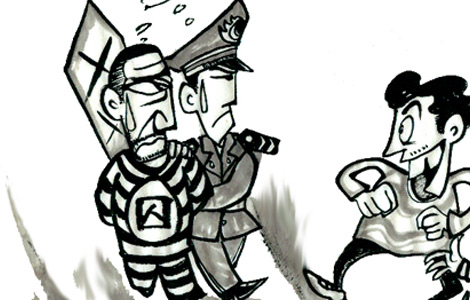 |
|
Ban lifted on inmate homosexuality China has made strides in protecting the human rights of prison inmates in recent years, including scrapping a conduct policy that discriminated against homosexual inmates, according to a judicial official in charge of penal human rights studies. The Ministry of Justice has rewritten the national code of conduct for prison inmates, eliminating bans on homosexuality, dyed hair and other lifestyles and practices that were previously not allowed in prisons. The revision was made in order to show respect for the human rights of prison inmates, according to Feng Cangjian, head of the Human Rights in Justice office of the ministry's Institute for Crime Prevention. The official said it is an international practice not to discriminate against homosexual inmates, but to instead restrict their behavior. "I raised the question when I visited prisons in the United States. Prison officials there told me homosexual partners are separated if they attempt to remain together," Feng said. [Read more] |
Prudent application of death penalty China further strengthened its control and prudent application of death penalty to guarantee rights of the person, says a report released by China's State Council Information Office. Titled Assessment Report on the National Human Rights Action Plan of China (2009-2010), the report says in February 2011 the Standing Committee of the National People's Congress (NPC) discussed and adopted Amendment VIII to China's Criminal Law. The amendment abolished death penalty for 13 types of economic and non-violent crimes, such as negotiable instruments fraud. The reduction accounted for nearly one fifth of the total number of death penalty crimes, it says. The report says the amended Criminal Law also laid down restrictive stipulations on the application of death penalty to people 75 years old and above. [Read more] |
|
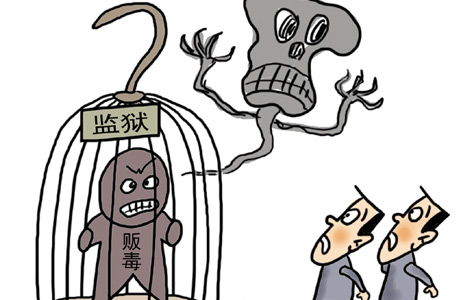 |
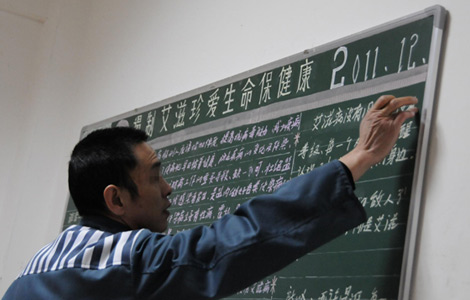 |
|
Lawbreakers serving sentences out of prison Zhang Wantao, a resident in Liaoning province, is a beneficiary of community rehabilitation programs. He was sentenced to 15 years in prison for assault. "I used to feel inferior to others, thus I often shunned away when coming across an acquaintance on the street," Zhang said, recalling his early days of medical parole after serving six years and eight months in prison. Then community rehabilitation pilot programs were launched in Zhang's community and he became one of the first beneficiaries. To Zhang's surprise, he found that the assumed discrimination and isolation didn’t happen at all. Instead, he was working with ordinary people like community officials and volunteers and was treated as an equal. In no time, Zhang became adapted to his new life. Acting as "psychological decompression chambers", community rehabilitation programs smooth the transition of criminals back to normal life after serving a long prison sentence by addressing their psychological alienation, says Xing Zhi, a law professor at Liaoning University in Northeast China. [Read more] |
AIDS inmates get special attention "Their spit could splash on my face when I talk to them face-to-face," said Chang Xuekui, a medical officer at Zhoukou Prison in Central China's Henan province who checks prisoners with AIDS every day. Chang and his colleagues visit ill inmates at the prison every day. And in order to gain their trust, they never wear masks or gloves. "AIDS is not a fatal disease, and we must let them know it," he said. Chang is only one of the officers working amid AIDS cellblocks in China's prisons. "Irritable, suspicious, self-abased and desperate - these are the most prominent features of AIDS-infected inmates," said Yang Peifang, an officer at the AIDS zone of Guangdong Women's Prison. The 41-year-old woman is in charge of 95 prisoners with AIDS and is called "Mother Yang" by the inmates. Yang took over the first batch of 16 AIDS-infected prisoners in 2005. [Read more] |
|
Photos: Life in Jail |
|
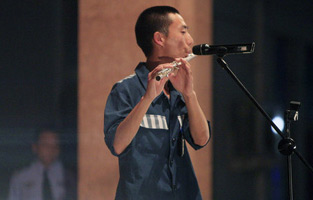 |
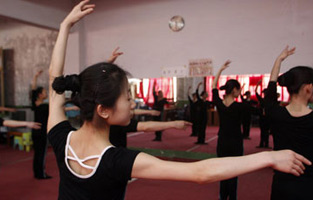 |
 |
|
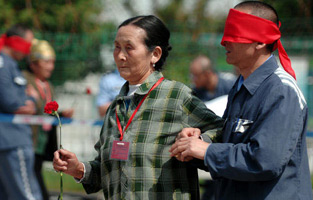 |
 |
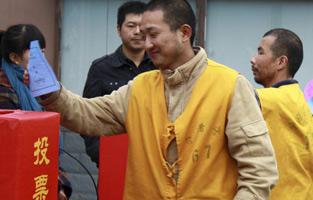 |